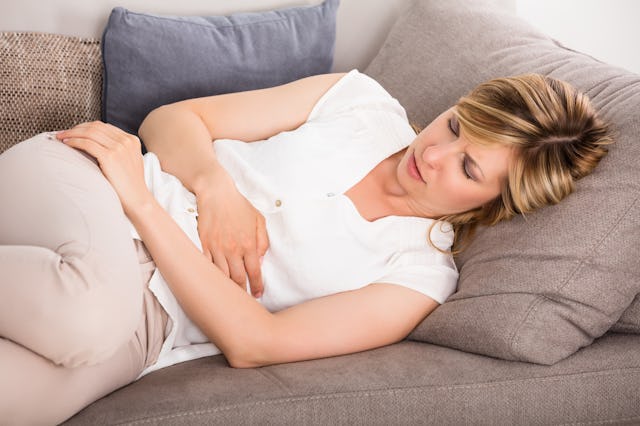For Many Women, Our Periods Get Worse As We Get Older (Cruel World!)

I was out raking the lawn one fine afternoon when I was 37 and was suddenly overcome by shakes, hunger, and the most horrid, anxious mood I had ever been in. There was no reason for my bitterness. I couldn’t think of one concrete cause. I knew I needed to calm the fuck down because my grip on the handle of the damn rake was so tight that I am pretty sure I could have snapped it in half.
I thought maybe I was pregnant again; it seemed like the only reasonable explanation. I went inside, ate like a wild boar, stayed in my fiery mood, and that night I lay awake in a pile of my own sweat, unable to sleep despite being beyond exhausted from all the raking, eating, and yelling at people.
The next day as I was headed to the drugstore to purchase a pregnancy test and a box of Twinkies with a side of Doritos, I realized it was just PMS. It was the worst case I had ever had. I was hopeful it was just a fluke, but I was wrong. The next month came, and I was just as unreasonable and anxious and hungry.
That was four years ago and here I sit, on the verge of another bout of PMS that makes me want to eat all the carbs and question every decision I have made in my life. My shark weeks these days are far worse than they ever were in my teens, 20s, and most of my early 30s.
After talking to a friend my age about this shitstorm we go through every month, she mentioned her cycle changed around 35 too. She noticed the cramping, bleeding, moodiness, and her appetite were so intense, she would race to the store to get a pregnancy test because she was sure this was so much more than just standard PMS.
But alas, it is PMS — PMS in the “in-between” years. The time when most women are done having babies, but have not yet entered menopause.
If you feel like your uterus is trying to kill you, and you just want to put an “Out of Order” sign around your neck every month while suffering through the crimson wave, there is a reason. According to Today contributor Dr. Judith Reichman, a women’s health expert who has been practicing obstetrics and gynecology for over 20 years and specializes in perimenopausal and menopausal care, our 40s are when our cycle starts to change because “during this decade, our ovaries are producing hormones through what [she] call[s] ‘follicular rejects.'”
We women are born with 1 million to 2 million immature eggs, known as oocytes. However, the majority of these cells die early, and at the onset of puberty, we are left with approximately 400,000. Then “over the next 25 years, unless we’re pregnant or on birth-control pills, one of these oocytes develops within a mature follicle that initially produces estrogen and after two weeks releases the egg (ovulation) and produces estrogen and progesterone,” Reichman explains. “For every oocyte that comes to fruition each month, thousands die, and this relentless path of death and destruction leaves us with fewer, and ‘less youthful’ oocytes in our 40s. They are less likely to fully develop into hormonally competent follicles that can secrete adequate amounts of estrogen and progesterone than those we had in our 20s and 30s.”
The decrease in good follicles does affect our cycle, Dr. Reichman says. “When a follicle develops poorly, it usually produces less hormone and may die off before its time, causing a menstrual period to occur sooner than usual; a 28-day cycle […] is now 24 days or less. If the diminished follicle produces too little estrogen, menopausal-type symptoms can occur even though you have your period. Scientists know that estrogen and progesterone affect the brain by altering levels of neurotransmitting substances; this, in turn, can have an affect on mood. As both estrogen and progesterone levels fall, especially at their nadir, or dip, just prior to and during your period, you may feel depressed, have hot flashes, night sweats and develop insomnia. During this period of low estrogen, you really can feel like you are experiencing a dress rehearsal for menopause.”
Not only do we start to have all the symptoms of menopause, our periods also become more extreme. According to Reichman, “one of the most prevalent causes of heavy or painful periods as we get ‘older’ […] is a condition called adenomyosis. Endometrial cells and glands grow into the uterine muscle wall, causing it to thicken. The glands prevent the muscle from properly contracting during the period and as a result the vessels running through the wall on their way to the lining (endometrium) are not properly squeezed shut, hence the period is heavy. The glands within the wall also swell and this generates pain.”
So we are still menstruating every month, but are bodies are starting to produce less estrogen and progesterone, which has a direct effect on how we feel about our thighs and people chewing loudly, and can make us anxious as fuck. But we are women and have been known to do everything from run a marathon, to remodel a kitchen, to hosting fundraisers during the week our crotch-bitch comes to visit. We know the show must go on, and it always does even though it really sucks sometimes.
So if you are going through some serious changes with your cycle, there is a scientific reason, not that it makes anything any better (although wine and chocolate do seem to take the edge off). It is normal, of course, but if you feel like there is something going on that is not right, you should always follow up with your gyno for reassurance and safekeeping.
This article was originally published on